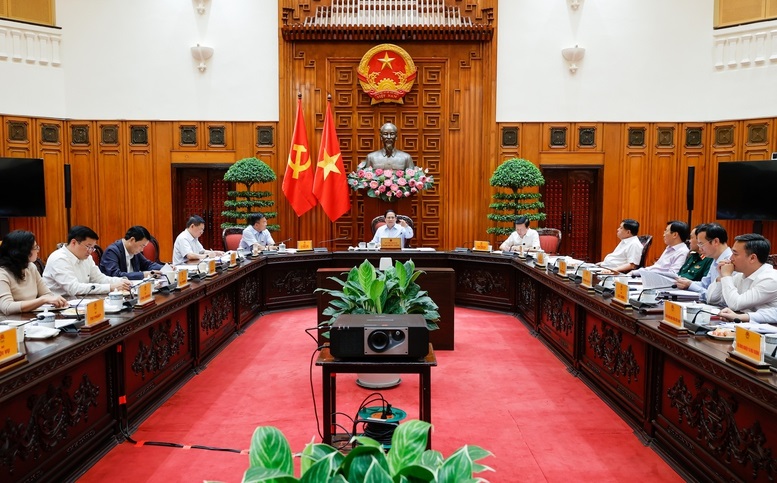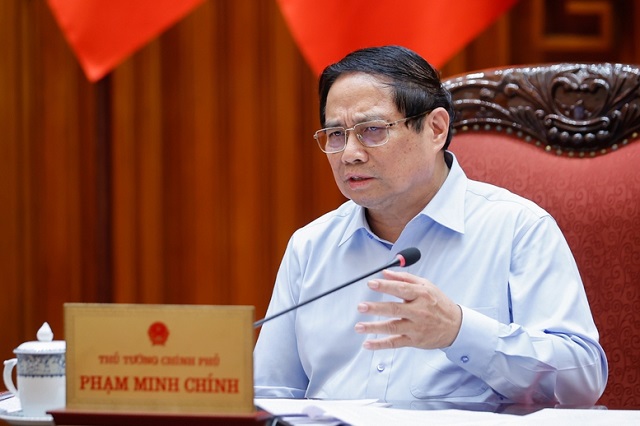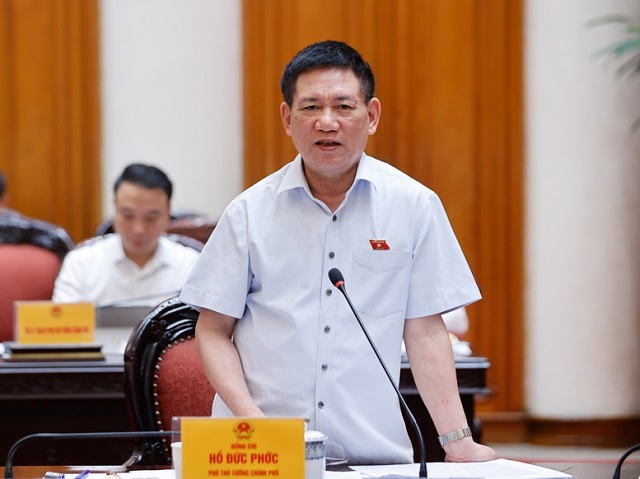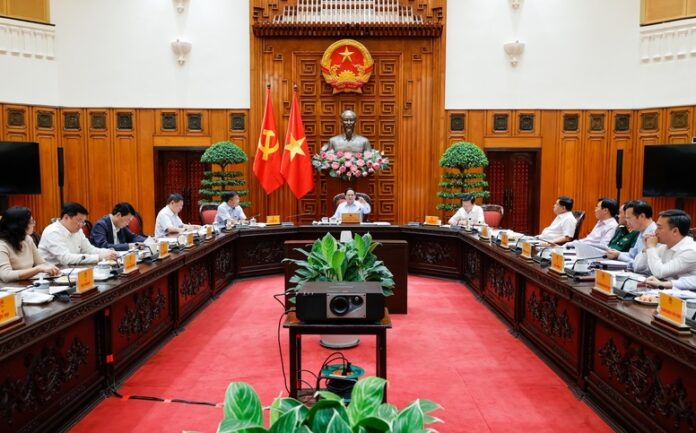
|
Prime Minister Pham Minh Chinh chairs the meeting of the Government’s
Permanent Members on drafting the National Assembly’s Resolution on special mechanisms and policies for private sector development. Source: VGP/Nhat Bac |
The Politburo has recently issued Resolution 68, emphasizing the vital role of
the private sector as the most important driving force of the economy and the
pioneer in scientific and technological development and innovation.
According to the Ministry of Finance, which led the drafting of the National
Assembly’s Resolution, the tasks and solutions outlined in Resolution 68 can be
categorized into three groups.
Group 1 comprises tasks and solutions that are relatively clear and
urgent but lack institutionalization or require immediate amendment and
supplementation. These fall within the National Assembly’s authority and are not
covered by laws to be discussed at the 15th National Assembly’s 9th session.
For this group, the Ministry of Finance proposes drafting a National Assembly
Resolution focusing on ten specific mechanisms and policies.
Group 2 includes tasks and solutions that are also relatively clear and
need immediate institutionalization or amendment. They fall within the scope of
laws to be discussed at the 9th session. This group consists of eight specific
mechanisms and policies. The Ministry of Finance recommends that the drafting
agencies urgently review and supplement these into the draft laws currently
before the National Assembly.
Group 3 consists of tasks and solutions that are directional and not
urgent, requiring further research and evaluation before proposing the
development or amendment of relevant laws for the National Assembly’s
consideration. The Ministry of Finance suggests including these in the draft
Government Action Program, assigning relevant ministries and sectors to carry
out studies and propose solutions according to a specific roadmap.
In his conclusion, Prime Minister Pham Minh Chinh commended the efforts of the
agencies involved in drafting Resolution 68 and the National Assembly Resolution
and the Government’s Action Program. He emphasized the urgency of
institutionalizing the Party’s directives in Resolution 68 so that the policies
can take effect immediately. Therefore, the National Assembly Resolution must be
submitted at the ongoing 9th session to address pressing issues. Given the tight
timeline and high expectations, a practical and feasible approach is necessary.

|
Prime Minister Pham Minh Chinh emphasizes the urgency of
institutionalizing the Party’s directives to bring policies into effect promptly. Source: VGP/Nhat Bac |
The Prime Minister provided additional insights for the agencies to refine the
draft, suggesting a focus on what businesses and people expect the most and what
is most necessary and urgent. He highlighted the importance of identifying
measures that can be implemented immediately without requiring extensive
resources and those that can serve as “drivers, levers, and pillars,” bringing
significant impact and truly addressing difficulties and bottlenecks. He also
emphasized the need to create a new momentum and trend for business development,
unleashing resources and productive forces.
With the determination to achieve the goal of having 2 million enterprises by
2030, twice the current number of nearly 1 million enterprises after nearly 40
years of renovation, the Prime Minister stressed the need for the most
straightforward and cost-effective administrative procedures, especially in
business establishment, dispute resolution, and bankruptcy.
Additionally, mechanisms should promote enterprise development to create jobs
and livelihoods for the people, encouraging household businesses to become
enterprises and small enterprises to grow into larger ones.
Concrete steps should be taken to ensure property ownership rights, freedom of
business, and equal competition, as outlined in Resolution 68. Public-private
cooperation should be enhanced through various forms, such as public leadership
and private management, public investment and private management, and private
investment and public use.
There should be more delegation to ministries, sectors, localities, and project
owners in ordering projects for businesses to implement, with the principle of
ensuring progress, quality, no capital escalation, and no corruption, waste, or
negativity. While the mechanisms should be flexible, there must be tools for
increased supervision and inspection.
Regarding taxes, the Prime Minister instructed the immediate implementation of
feasible measures and further research for those requiring additional study.

|
Deputy Prime Minister Ho Duc Phoc speaks at the meeting.
Source: VGP/Nhat Bac |
Emphasizing the need to provide assurance to people and businesses in
investment, production, and business, the Prime Minister referred to the content
in Resolution 68 regarding “adhering to the principle of distinguishing between
criminal and administrative and civil liability; between legal entities and
individuals in handling violations.” He stressed that when handling civil
economic violations, civil and economic measures should be given priority, and
businesses and businessmen should be allowed to proactively remedy violations
and damages. In cases where practical law enforcement may lead to criminal
prosecution or non-prosecution, criminal prosecution should not be applied. If
criminal prosecution is unavoidable, economic remedial measures should be
prioritized and considered as an important basis for determining subsequent
handling measures.
The Prime Minister assigned Deputy Prime Minister Nguyen Chi Dung to continue
directly guiding the drafting of the Resolution, emphasizing the need to avoid
perfectionism and haste. He requested that the business community’s feedback be
promptly gathered and the Resolution be refined within May for submission to the
9th session of the National Assembly, in line with Resolution 68 of the
Politburo.
The Prime Minister directed the development of the Government’s Action Program
to implement Resolution 68 with high determination, great efforts, resolute
actions, and a focus on key tasks and targets. He emphasized the need for
clarity in terms of people, tasks, timelines, responsibilities, authority, and
products.
He also noted the importance of effective communication about policies on
private sector development based on the resolutions of the Party and the
National Assembly and the Government’s Action Program.
Nhat Quang – 08:30 05/08/2025
Unlocking Vietnam’s Economic Growth: The Four Pillars of Transformation
“Vietnam’s path to prosperity lies in a comprehensive development strategy, centered on nurturing private enterprises, efficiently mobilizing financial resources, and harnessing the power of local initiatives. The country’s focus on empowering private enterprises and efficiently managing financial resources will unleash the potential of local communities, ensuring social stability and a thriving economy.”
Unleashing the Private Sector: Removing the Brakes for a True Economic Breakthrough
In the context of Vietnam’s intensified reform and international integration, the private sector is increasingly asserting its pivotal role in the economy. However, to truly unleash its potential, a comprehensive strategy is needed to address the existing constraints. In an interview with the Government Online Newspaper, Professor Vu Minh Khuong, a lecturer at the Lee Kuan Yew School of Public Policy (National University of Singapore), shared his insights on the obstacles, opportunities, and directions to enable the private sector to become a driving force for the country’s development.
The Challenges Faced by Social Housing Developers: Navigating the Complexities of Mechanisms and Policies
At the 2024 Sustainable Real Estate Market Development Forum, social housing took center stage as a key area of focus for both regulators and businesses alike. This segment, aimed at addressing the housing needs of low-income individuals, has garnered attention due to the supportive policies in place. Despite this, businesses operating in the social housing sector continue to grapple with various challenges.





















